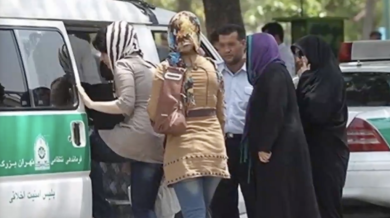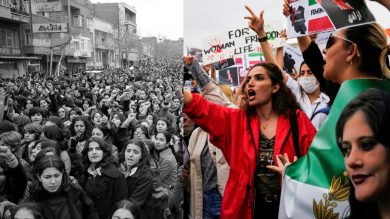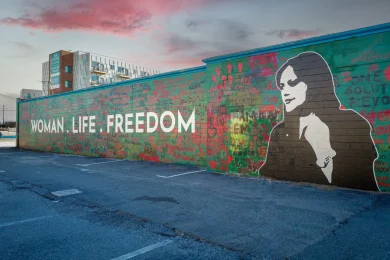In the heart of Tehran, hidden behind tall concrete walls and barbed wire, stands Evin Prison — a fortress of fear and defiance. For decades, this notorious detention center has been the regime’s iron fist: a place where students, journalists, feminists, environmentalists, and anyone who dares to speak truth to power are silenced.
But even in this fortress, voices refuse to die. Letters smuggled from Evin have become testaments of courage, dignity, and the unbreakable human spirit.
These are not just prison writings — they are the raw, defiant heartbeat of a nation that will not be crushed. This is the story of Iran’s political prisoners, and how their words inspire a movement for justice that transcends the prison walls.
1. Evin Prison: A Symbol of State Violence
Evin Prison is more than just a detention center — it’s the regime’s message to the people: “Obey, or you will vanish.”
A History of Horror
Built in the 1970s by the Shah’s secret police, Evin was repurposed after 1979 by the Islamic Republic. Under the watchful eye of the IRGC and intelligence services, it has become:
• A torture chamber: Electric shocks, beatings, psychological torment.
• A factory of forced confessions: Detainees coerced into denouncing themselves on camera.
• A graveyard of the disappeared: Thousands executed in the 1980s and beyond.
• A modern gulag: Where political prisoners today are packed into filthy cells, deprived of sunlight and hope.
But even here, the regime cannot extinguish the spark of freedom.
2. Who Are the Prisoners?
Political prisoners in Iran come from every walk of life:
• Students demanding free speech and democracy.
• Women’s rights activists like Narges Mohammadi, who challenge gender apartheid.
• Environmentalists fighting for clean air and water.
• Ethnic and religious minorities demanding dignity and recognition.
• Journalists and writers who refuse to be the regime’s mouthpiece.
• Labor leaders who won’t accept poverty and exploitation.
They are Iran’s conscience — the voices the regime fears most.
3. Why Letters Matter
In the face of brutal repression, why do prisoners risk smuggling out letters? Because:
• Truth cannot be killed: These letters expose the regime’s lies and crimes.
• Connection sustains hope: Prisoners remind the world — and themselves — that they are not alone.
• History must be written: Letters are the record of what the regime tries to erase.
Each smuggled note is an act of rebellion. Each word is a crack in the prison walls.
4. Women at the Vanguard
Among the most powerful voices from Evin are those of Iranian women.
Narges Mohammadi
A journalist and human rights defender, she has spent years behind bars. In 2022, she smuggled out a letter describing solitary confinement as “a place of torture and spiritual death” — yet insisted, “Even here, I refuse to be broken.”
Sepideh Qoliyan
A labor rights activist, Sepideh has been arrested, beaten, and paraded on forced confessions. Her letters from Evin tell of her refusal to betray her fellow prisoners — and her dream of a free Iran.
Atena Daemi and Yasaman Aryani
These young women have spent years in prison for demanding gender equality. Their letters call on the world to see the regime’s violence not as “cultural,” but as political.
5. Letters as Resistance Literature
Iran has a long tradition of prison literature — from the poetry of Ahmad Shamlou to the memoirs of those who survived the 1980s massacres.
Today’s prisoners carry on that tradition:
• Poems scribbled on scraps of paper that pass from cell to cell.
• Journals hidden in laundry or food deliveries.
• Tiny notes smuggled out in lawyers’ briefcases or family visits.
These are not just personal diaries — they are collective manifestos against tyranny.
6. What the Letters Reveal
Letters from Evin give us a rare, firsthand view of what the regime wants hidden.
Torture and Humiliation
Prisoners write of:
• Sleep deprivation and beatings.
• Sexual abuse — especially against women and LGBTQ+ prisoners.
• Solitary confinement used to crush the mind and soul.
• Forced confessions used for propaganda.
Psychological Warfare
Prisoners are:
• Denied medical care for chronic illnesses.
• Forced to watch executions or hear them in the halls.
• Told their families will suffer if they do not “repent.”
Defiance in the Darkness
Yet these letters also reveal:
• Songs sung in the cells to lift spirits.
• Secret classes where prisoners teach each other law, history, and resistance.
• Friendships forged that outlast the walls.
7. The IRGC’s Role: Prison as Policy
The IRGC’s Intelligence Organization (SAS) runs many of the political wards in Evin. Its officers decide who lives, who dies, and who is broken.
For the IRGC:
• Prison is a laboratory: They test methods of control and confession.
• Prison is a propaganda tool: They film forced confessions to show “loyalty” to the regime.
• Prison is a warning: Every protester, every journalist is told: This is your future.
But for every prisoner who writes a letter, the regime’s power crumbles a little more.
8. The Impact Beyond Iran
Letters from Evin do not just speak to Iranians — they speak to the world.
• They give human rights groups evidence to push for sanctions and investigations.
• They remind governments that deals with the regime have a human cost.
• They inspire exiles to organize protests, vigils, and legal campaigns.
• They connect Iran’s struggle to global movements for justice.
Each letter is a bridge — from Evin’s darkness to the world’s conscience.
9. The World’s Responsibility
When prisoners risk everything to speak, the world must listen — and act.
Here’s how:
✅ Raise their voices
Share letters and testimonies on social media, in the press, and in parliaments.
✅ Demand accountability
Push for Magnitsky-style sanctions on IRGC officials who run Evin and other torture sites.
✅ Support families and exiled communities
They carry the pain of these prisoners and keep their names alive.
✅ Recognize gender persecution
Women prisoners are targeted in unique ways — international law must recognize this as a crime.
✅ Never normalize
Engagement with the regime must never ignore the price paid by these prisoners.
Conclusion: Light in the Dark
The letters from Evin are not just stories — they are acts of courage that defy the regime’s deepest fear: that the truth will outlive their walls.
Every prisoner who writes is telling the IRGC and the world:
“You can lock up my body. But you will never imprison my voice.”
For those of us free to speak, the message is clear:
Listen. Amplify. Act.
Because in the end, it’s not the bars of Evin that matter. It’s the voices that slip through them — and the world that refuses to let them be silenced.
Join Our Newsletter!
Stay informed with the latest updates, news, and ways to take action in the fight for justice and global security. Sign up now to get updates delivered straight to your inbox!




